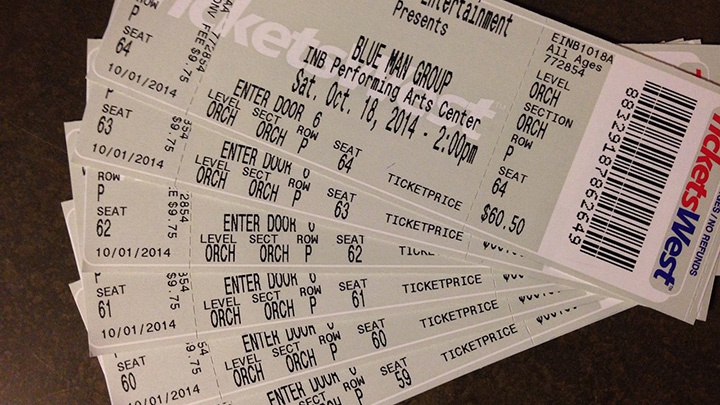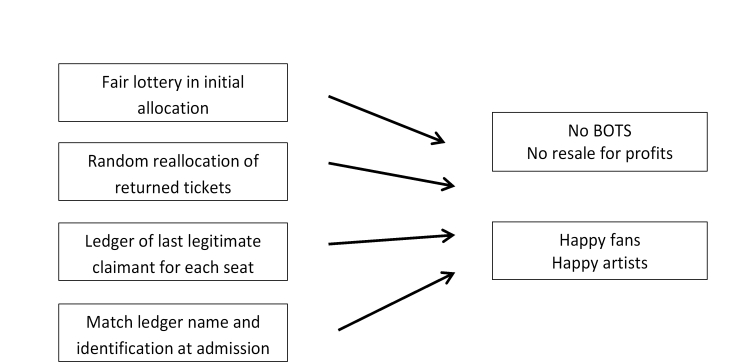By Pascal Courty
The event industry has been plagued by an epidemic of ticket bots that take advantage of online ticketing to grab the best tickets for high demand events and to earn large profits on resale markets. I define the fair price ticketing curse and propose a simple mechanism to get rid of bots.
Have you ever tried to purchase a ticket for a hot event? What you probably recall is tremendous frustration after spending much time on web reservation systems in vain… until you were told that the event was sold out. And you subsequently discovered that the same tickets you were trying to acquire were offered at insanely higher prices on Stubhub and some other online marketplaces.
This post reviews the problems with event ticket sales, explain why these problems occur, and proposes a solution to take some of the pain out of ticket sales. I focus on situations where ticket prices to not correspond to underlying demand conditions. Some events are meant to be free (a public lecture or Papal audience), sold at cost (non-profit event) or at prices that are significantly below those that prevail in secondary markets (the superbowl and some extremely popular shows such as Hamilton, Ed Sheeran…). Although many wonder why underpricing occurs for a select set of events, I take this as a reality that will not end soon, and I investigate how to best deal with the bot problem.
If you ask artists you’ll hear something along these lines: I want to set fair prices so that my fans are able to attend no matter how much they earn or how rich they are. But scalpers use bots and there is nothing I can do about it. Bots are computer programs that game reservation systems to scoop the best tickets. How do bots get their way? Ticketmaster, the leading ticket distributor in North-America, is aware of the problem and tries to screen genuine fans from bots but as soon as it sets up new screening methods (checking IP addresses, credit card numbers…) the bots find ways around it. It’s a wack-a-mole game.
Discontent about ticket availability has increased with the advent of online ticketing. Setting fair prices for tickets is cursed because fans do not benefit! Massive decrease in the costs of acquiring and reselling tickets has enabled large scale profiteering. Before moving on, I want to dispel three myths:
-
- The first myth is that everyone can purchase a ticket at face value. That is simply not possible if the price is deliberately set below market value, many people want to attend, and there is a limited number of seats.
- The second myth is that resale is the culprit. Again that’s not exactly true. Resale can be good. Say you did manage to buy a ticket but fell ill a couple of days before the event. Wouldn’t you be glad to resale your ticket. And the artist wants you to do excactly that. What’s worse than an empty seat?
- The third myth is that all artists want low prices. It may be true for some artists but it’s not for the majority of events (Krueger, 2019).
What solutions have been proposed? Governments have passed laws to criminalize bots, but these laws are difficult to enforce because ticket resale is a victimless crime that can easily move out of the jurisdictions where it is punished. The same goes with controlling resale prices.
Can fans have a smooth ticket buying experience? Can artists sell tickets at low prices in some kind of gift exchange with fans? Ask the economists. They’ll tell you about two options. First, you can increase prices. And the huge price inflation in concert tickets attest of that (Krueger, 2019). Or supply has to increase. This is what Garth Booth does. They add shows till everyone in town has had a chance to attend.
What about the artist who does not want either of these solutions? This artist wants fair prices; give only one or a small number of shows; and allow ticket transferability. The solution I propose in an article recently published in the Journal of Cultural Economics is to implement a fair lottery in the primary market (Courty, 2019). The trick to prevent resale for profit is to associate each ticket with a name and to check identification at admission, a bit like a plane tickets, but with the caveat that ticket holders can return tickets in the event they cannot attend. The returned tickets are resold to the fans who were unlucky in the initial lottery. The price may be set below face value if there is not enough demand but never above face value to respect the artist’s gift motive. The reallocation of returned tickets has to be random in order to prevent side-payments between the person who returns a ticket and the fan who receives it. I call this system a centralized exchange because it is necessary to keep a ledger of the last legitimate claimant for each seat and to maintain an updated virtual queue of fans. This mechanism works because tickets gives access to the event only if they have been transferred through the centralized exchange. There is no point for bots to purchase tickets that cannot be resold for profit!
So sum up, selling event tickets does not have to be painful. The trick is to give artists a choice: sell tickets at market prices and permit resale for profit or sell at a fair price using the scheme described above. It should be up the artists to decide and it is conceivable that the same artist could sell the best tickets at market price and the remaining tickets using a lottery. And fans should be told when they purchase a ticket whether it is transferable at face value back to the artist or for profit on online marketplaces. The policy implication is that there is no one size fit all regulation: the government enforces the two types of ticket contracts described above and requires artists to declare how they sell their tickets, adding much transparency in the market, and eliminating bots and the stress out of ticket sales. Fans know whether they have to pay the market price or whether they are participating in a fair lottery.
References:
Bhave, Aditya, and Eric Budish. Primary-Market Auctions for Event Tickets: Eliminating the Rents of’Bob the Broker’?. No. w23770. National Bureau of Economic Research, 2017.
Ticket resale, bots, and the fair price ticketing curse. Courty, Pascal. Journal of Cultural Economics (2019). https://doi.org/10.1007/s10824-019-09353-4
Krueger, Alan B. Rockonomics: A Behind-The-Scenes Tour of What the Music Industry Can Teach Us about Economics and Life. Broadway Business, 2019.
The article is based on:
Courty, P. J Cult Econ (2019). https://doi.org/10.1007/s10824-019-09353-4
About the author:
Pascal Courty, Professor and Graduate Advisor, University of Victoria, Canada
Image source:
https://ideastations.org/radio/news/ticket-resale-bills-pass-both-houses


Leave a Reply